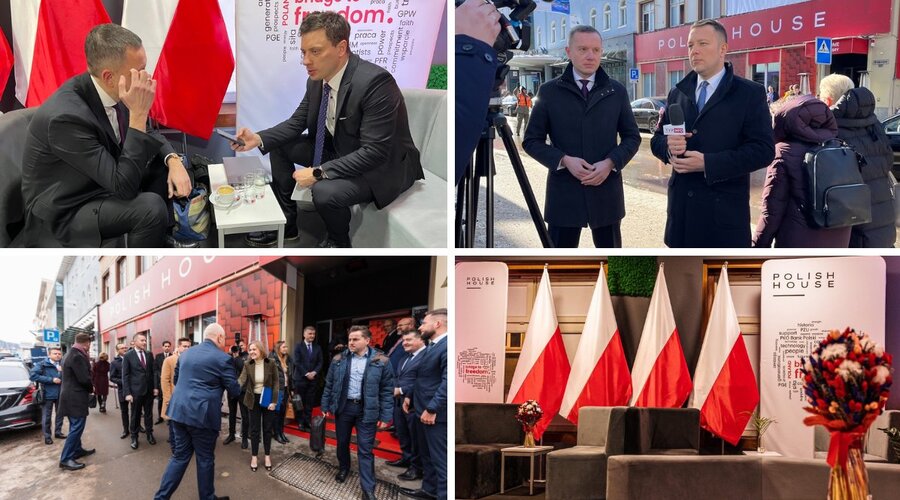Copper – a foundation of the modern economy – KGHM at the World Economic Forum in Davos
Discussion panels, business meetings, and promotion of the Polish economy - KGHM’s delegation is taking part in one of the most prestigious events of the year, the World Economic Forum in Davos, Switzerland. The topics discussed at the meetings included energy transition issues and digital security.
The World Economic Forum in Davos is an event that focuses on the world’s major social and economic issues. Its participants include politicians, representatives of major corporations and organizations, as well as scientists and economists. Representatives of KGHM’s management board are taking part in, among other things, meetings on the involvement of various countries in helping Ukraine and on plans for the energy transition in Europe.
“Climate change, the war in Ukraine, and the associated energy crisis require us to act decisively. We are already experiencing the effects, including financial ones, related to, among other things, rising energy prices. Our plants consume about 3 TWh of electricity per year, which makes us the second larger consumer in Poland. Ensuring stable supplies and the cheapest possible energy is one of our main challenges,” stressed Tomasz Zdzikot, the President of the Management Board of KGHM Polska Miedź S.A., in interviews.
KGHM’s CEO believes that the energy transition is not only a challenge, but also a great opportunity for the company. “Green technologies, the development of artificial intelligence, and the development of 5G networks - these modern processes have one thing in common - copper,” added Tomasz Zdzikot.
KGHM’s delegation discussed the economic situation and the strategic challenges faced by the mining sector with representatives of Antofagasta Minerals. During a closed-door meeting, the CEOs Tomasz Zdzikot and Ivan Arriagada discussed building a strong relationship between the two corporations.
“KGHM’s heart is in Lower Silesia, but Sierra Gorda is one of the most important international projects for us. In addition to a discussion about the fiscal situation in Chile, we also talked about the prospects for copper, which look promising. We produce something on which the modern economy is based,” added the CEO of KGHM.
Representatives of the Chilean corporation congratulated KGHM on the results achieved in Sierra Gorda and the modern technologies used at that mine. Both parties declared further cooperation and exchange of experience. Tomasz Zdzikot said that the Davos forum was an excellent opportunity for the most important politicians and experts on the global economy to meet.
KGHM is the co-organizer of the Polish House at the Davos forum. The building, located next to the buildings where the main event is held, is a venue for the promotion of Poland and for business meetings. Participants in such meetings include President Andrzej Duda, Prime Minister Mateusz Morawiecki, and Deputy Prime Minister and Minister of State Assets Jacek Sasin.
On the other hand, Mirosław Kidoń, KGHM’s Vice President for International Assets, was among the panelists in the debate titled “Energy Outlook: sustainable development as an economic opportunity for Poland.”
The Vice President said during the debate that the war in Ukraine has led to a reevaluation of the strategy for ensuring energy security not only in Poland, but across Europe. According to Mirosław Kidoń, in this regard, “it is difficult to question the need to expand Poland’s energy mix - if we take seriously the challenges we face in the areas of security, ecology, and competitiveness of our economy.”
To reflect the changes in the global market, KGHM updated its existing four strategic development directions (flexibility, efficiency, ecology, and e-industry) with an additional fifth element - energy. The company is consistently diversifying its sources of electricity, focusing on energy from photovoltaic, wind, and hydrogen sources.
In 2021, KGHM adopted a Climate Policy, which sets out the company’s targets for greenhouse gas emissions until 2030 and 2050, as well as the scope and extent of the changes needed to achieve these targets. Achieving climate neutrality by 2050 is the overarching goal specified in the document. The intermediate goal is to reduce total emissions by 30% by 2030 in relation to the base year of 2020.
KGHM’s goal is to produce 50% of the electricity it consumes in its own installations. We design and build PV installations in locations convenient for direct connection to the divisions that consume the energy. We are currently engaged in 10 photovoltaic projects.
Last year, the copper sector leader submitted the first application to the National Atomic Energy Agency for the evaluation of small modular reactor (SMR) technology. The company’s investment plans also include Offshore Wind Energy. In this area, the company is working with TotalEnergies Renewables under a strategic cooperation agreement.
Representatives of KGHM’s management board point out that copper is a raw material without which the energy transition and sustainable development will not be possible, and this offers great opportunities for Poland’s economic development.
The slogan of this year’s World Economic Forum in Davos is “Cooperation in a fragmented world.” The event is attended by nearly 2,500 people from around the world.



